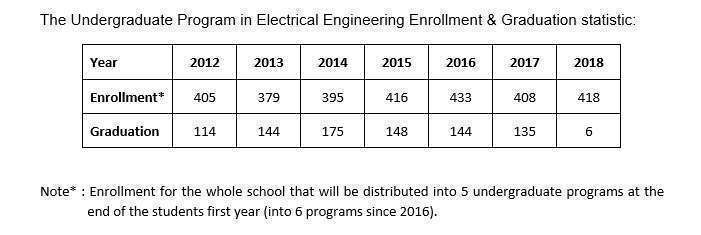Electrical Engineering is among the most significant engineering field which drives the evolution of human civilization in the last centuries. It is expected will continue to be the one in the foreseeable future. A new frontier of human endeavor is opened every moment which are only possible by the technology delivered by electrical engineering.
Electrical engineer undoubtedly become the necessary agent of such transformation by delivering a best engineering practice in every possible aspect i.e. delivering an best practice in maintenance and operation; creating a new product and innovation; pursuing state-of-the-art research etc. The demand for electrical engineer is among the highest in engineering.
The Electrical Engineering Program at SEEI ITB is made up of 53 faculty members who are well respected in their areas of research and education. They engage in research activities encompassing a wide range of areas such as automatic control, biomedical engineering, communications, computer-aided design, machine vision and image processing, computer systems & networking, digital signal processing, electronics, electrical energy, information networking, intelligent systems, parallel and distributed processing, microelectronic materials and devices, microwave engineering and VLSI integrated circuit design.
Program Educational Objectives
- Our graduates will have successful careers in their engineering professions.
- Our graduates are capable to be admitted in and successfully completing their graduate studies.
- Our graduates will have leadership and play active role in industry, government or education sectors in the Asia Pacific region especially in Indonesia.
Student Outcomes
General Enginering Criteria (ABET)
- an ability to apply knowledge of mathematics, science, and engineering
- an ability to design and conduct experiments, as well as to analyze and interpret data
- an ability to design a system, component, or process to meet desired needs within realistic constraints such as economic, environmental, social, political, ethical, health and safety, manufacturability, and sustainability
- an ability to function on multi-disciplinary teams
- an ability to identify, formulate, and solve engineering problems
- an understanding of professional and ethical responsibility
- an ability to communicate effectively
- the broad education necessary to understand the impact of engineering solutions in a global, economic, environmental, and societal context
- a recognition of the need for, and an ability to engage in life-long learning
- a knowledge of contemporary issues
- an ability to use the techniques, skills, and modern engineering tools necessary for engineering practice
Electrical Engineering Criteria (ABET)
- breadth of knowledge over all areas within electrical engineering (electromagnetic, power, electronics, signals and systems, and computer engineering)
- depth of knowledge in at least one area
- knowledge of probability and statistics, including applications to electrical and computer systems
- knowledge of mathematics through differential and integral calculus
- knowledge of basic sciences, computer science, and engineering sciences necessary to analyze and design complex electrical and electronic devices, software, and systems containing hardware and software components
- knowledge of advanced mathematics, linear algebra, complex variables, and discrete mathematics
- background for graduate study
Career Prospects
A degree in electrical engineering can qualify you to pursue a job in almost any industry you can think of. After all, nearly everyone uses electricity and electrical devices, so industries demand skilled professionals to build, repair, and improve these devices. Electrical engineers work several key industry sectors such as: Telecommunications, Energy and Electric Power, Computers, Semiconductors, Aerospace, Bio engineering, Manufacturing, Services, Education and Research, Transportation and Automotive.
The following job titles represent only a handful of the choices available:
- Research engineers work in the lab, testing and inventing. This job requires a high level of creativity on the part of the engineer, as well as a great deal of patience. Whether inventing a new opto-electronic device or simply designing a better electric can opener, research engineers are responsible for the discovery-stage technology behind any new electronic product.
- Once a new technology is invented, it must be applied. The design engineer uses computer simulations and models to turn innovations like wireless technology into the tiny parts that make up an actual cell phone. Design engineers must visualize how the insides of a future product could look, while inventing several possible scenarios for the applications of new technologies.
- The project engineer oversees many specialist engineers throughout the construction of a working prototype of a new product or technology. The project engineer must have natural leadership ability, as well as a high proficiency in a variety of electrical engineering disciplines.
- Test engineers design programs to check the functions of electronic devices and to troubleshoot those devices when things go wrong. They keep technology working properly, and understand which elements to test and in what order. Successful test engineers remain sharp, even after long hours on the job.
- Power grids, phone lines, and wireless networks all require the skills of a system engineer for proper installation and maintenance. Keen attention to detail is important for graduates who enter this profession. Experienced system engineers rely on their ability to think holistically about the systems they create.
- Application engineers work with whatever resources are available, adapting existing equipment and technologies to fulfill the needs of their employers. They need to be resourceful, while counting on their deep understanding of the capabilities and the potential modifications of existing equipment.
Please read attached Electrical Engineering Undergraduate Handbook for more information about this program.



